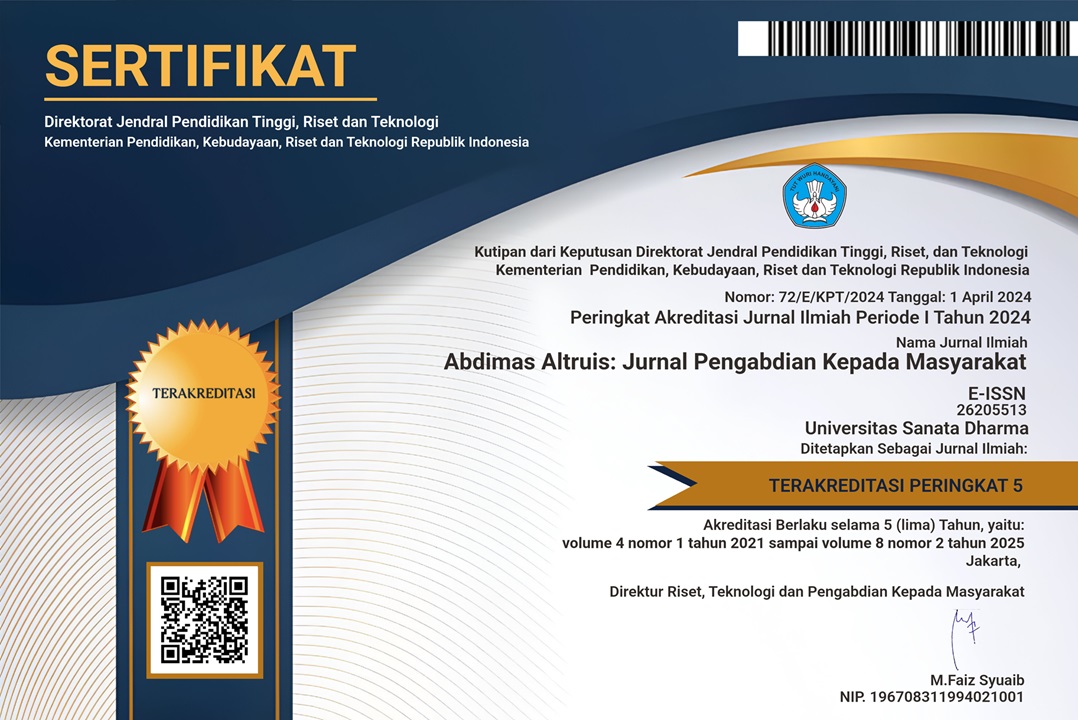PEMANFAATAN EDMODO UNTUK MEMPERSIAPKAN GURU MENGHADAPI PEMBELAJARAN ABAD 21 DI MGMP MATEMATIKA SMA KABUPATEN PONOROGO
(1) Jurusan Matematika, Universitas Negeri Surabaya
(2) Jurusan Matematika, Universitas Negeri Surabaya
(3) Jurusan Matematika, Universitas Negeri Surabaya
(4) Jurusan Matematika, Universitas Negeri Surabaya
(*) Corresponding Author
Abstract
Keywords
Full Text:
PDFReferences
Anderson, L.W. dan Krathwohl, D.R. (eds). (2001). A taxonomy for learning, teaching, and assesing: A revision of Bloom’s taxonomy of educational objectives. New York: Longman
Arends, R.I. (2008). Learning to teach–Belajar untuk mengajar. Jakarta: Pustaka Pelajar
Ariyana, Y., Pudjiastuti, A., Bestary, R., Zamroni. (2018). Buku pegangan pembelajaran berorientasi pada ketrampilan berpikir tingkat tinggi. Direktorat Jenderal Guru dan Tenaga Kependidikan Kementerian Pendidikan dan Kebudayaan.
Barrat, C. (2014). Higher order thinking and assessment. International Seminar on current issues in Primary Education: Prodi PGSD Universitas Muhammadiyah Makasar.
Norman, G. R., & Schmidt, H. G. (2000). Effectiveness of problem-based learning curricula. Medical Education, 39(4), 721-728. https://doi.org/10.1046/j.1365-2923.2000.00749.x
Kemdikbud. (2016). Permendikbud nomor 23 tahun 2016 Bab II Pasal 2 tentang standar penilaian kurikulum 2013.
Kemdikbud. (2016). Permendikbud nomor 24 tahun 2016 tentang kompetensi inti dan komptensi dasar kurikulum 2013.
Malik. (2001). Media pendidikan: Pengertian model discovery learning.
Resnick, L.B. (1987). Education and learning to think. Washington, DC: National Academy Press
Tan, O.S. (2003). Problem based learning innovation: Using problem to power learning in 21st century. Singapore: Thomson Learning.
Thompson.T. (2008). Mathematic teacher’s interpretation on higher order thinking in Bloom’s taxonomy. International Electronic Journal of Mathematic Education, 3(2), 96-109. https://doi.org/10.29333/iejme/221
Trilling, B., and Fadel, C. (2009). 21st century skills: Learning for life in our times. Jossey-Bass: San Fransisco
Zwang, J. (2010). Edmodo: A free, secure, social networking site for school. Diambil dari http://www.eschoolnews.com/2010/12/15/edmodo-a-free-secure-social networkingsitefor-school/
DOI: https://doi.org/10.24071/aa.v5i2.4430
Refbacks
- There are currently no refbacks.
Abdimas Altruis: Jurnal Pengabdian Kepada Masyarakat telah terakreditasi nasional Sinta 5 oleh Kementerian Pendidikan, Kebudayaan, Riset dan Teknologi Republik Indonesia berdasarkan surat keputusan No.Surat Keputusan 0547/E5 /DT.05.00/2024. Masa berlaku 5 tahun : Vol 4 No 1 Tahun 2021 s/d Vol 8 No 2 Tahun 2025.

Terindeks oleh:
This work is licensed under CC BY-SA.
Creative Commons Attribution-ShareAlike 4.0 International License.
Abdimas Altruis: Jurnal Pengabdian Kepada Masyarakat diterbitkan dua kali setahun, yakni pada April dan Oktober,
oleh Lembaga Penelitian dan Pengabdian Kepada Masyarakat, Universitas Sanata Dharma, Yogyakarta, Indonesia.






















